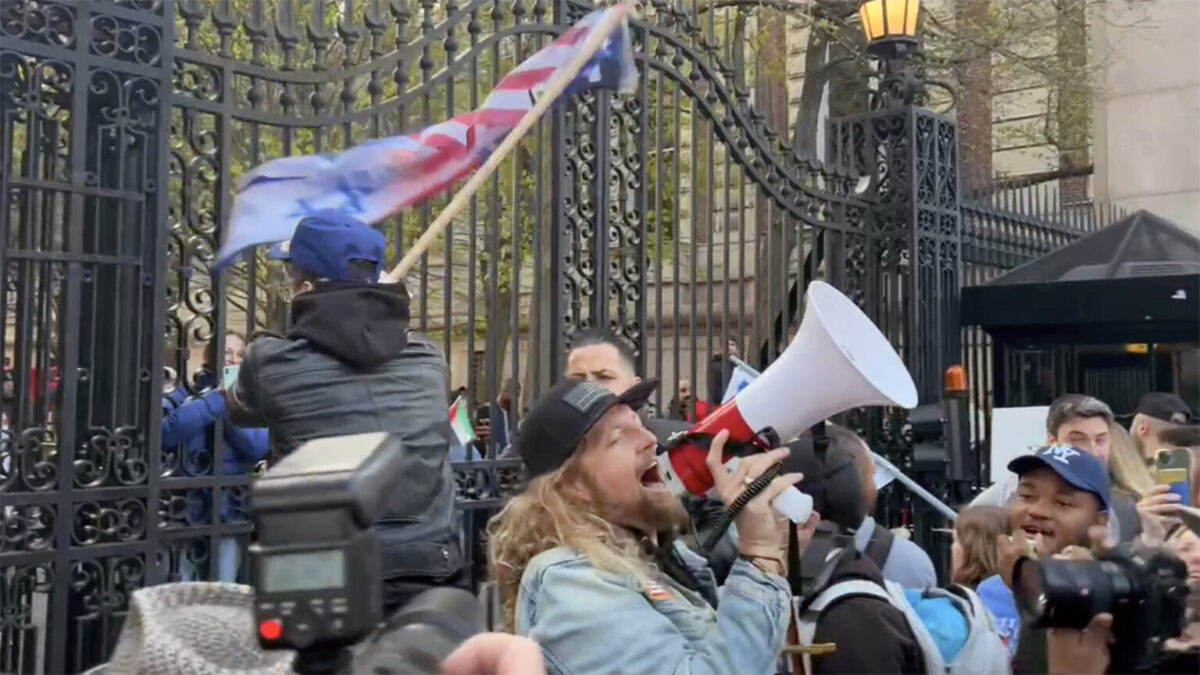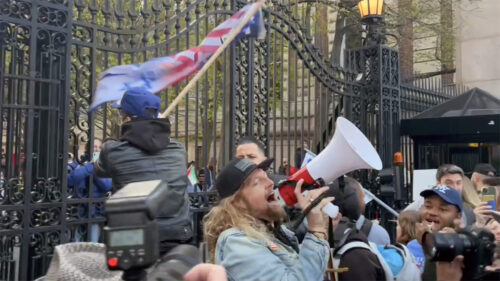
(RNS) — When “How Great Is Our God” first hit the worship charts in the fall of 2004, George W. Bush was in the White House, Barack Obama was a little-known Illinois lawmaker just elected to the U.S. Senate, Donald Trump was a would-be reality TV star and scholars were just starting to pay attention to an uptick in the people known as “nones.”
Twenty years later, the song, co-written by Chris Tomlin, Jesse Reeves, and Ed Cash, remains a hit — currently No. 4 on the CCLI worship chart, popular in small groups and stadium worship concerts.

Musician Sean Feucht leads a version of “How Great Is Our God” with a bullhorn during the “United for Israel” march at Columbia University, April 25, 2024, in Manhattan, New York. (RNS photo/Fiona André)
It’s also become the theme song for Christian Nationalists.
“How Great Is Our God” was sung by protesters during the Jericho marches that preceded the Jan. 6 attack on the U.S. Capitol and has been a staple at Christian Nationalism conferences in recent years. And last week, when MAGA activist and worship leader Sean Feucht stood at the gates of Columbia University to oppose pro-Palestinian protesters and to demand that the school’s president resign, “How Great Is Our God” was on his lips.
“Our hearts will sing how great is our God,” he sang into a bullhorn, with a drummer in the background and a flag bearing the Stars and Stripes alongside a blue and white Star of David waving overheard.
At first listen, “How Great Is Our God” seems an unlikely candidate for a Christian Nationalism protest song. There is nothing overtly political or partisan about the lyrics, and the song is sung in churches of all shapes and sizes. And it remains extraordinarily popular. The song first appeared on the Top 100 list compiled by Christian Copyright Licensing International, which licenses music for use in churches, in October 2004 and has remained there ever since, often among the top 10 songs.
Leah Payne, a religious historian and author of “God Gave Rock & Roll to You,” said “How Great Is Our God” showcases the skill of Tomlin and his co-writers — who have fused the power of stadium rock anthems with Christian lyrics, creating songs with infectious hooks that draw a crowd into singing along.
“I don’t think they get enough credit for being skilled at what they do,” she said.
“How Great Is Our God” also harks back to an earlier era of worship music, she said, before megachurches such as Hillsong, Bethel, and Elevation dominated the industry. The hit songs churned out by those churches often rely on vocal acrobatics and sophisticated arrangements — filled with white space and instrumentals, which makes them harder to pick up spontaneously.
By contrast, “How Great Is Our God,” at its heart, is a guy with a guitar. The song is so simple and catchy that Tomlin admitted he was a bit embarrassed when he first wrote it. But the chorus had magic to it — giving it the kind of power of a song like “We Shall Overcome,” sung at protests for generations.
“A guy with guitar — or a woman with a guitar — could just pick it up,” said Payne. “It’s just a well-written pop song.”
Payne said worship songs like “How Great Is Our God” work well at protests, regardless of what the protest is about. For example, she said, “Waymaker,” another hit song, was sung both at Black Lives Matter protests and at anti-vax rallies in 2020.
The lyrics of a song like “How Great Is Our God” can be vague enough that verses describing the God of the Bible could easily be adapted to mean the God of America or the God of a particular group of people.
“When I think of ‘How Great Is Our God,’ I wonder, who is the ‘our’?” Payne said.
Matthew D. Taylor, a senior scholar at the Institute for Islamic, Christian, and Jewish Studies and author of a forthcoming book about the New Apostolic Reformation, says there’s a reason why activists like Feucht pick popular worship songs to play at their rallies. If Feucht, a musician and worship leader, sang his own songs, which can be more overtly political, no one would sing along — since they are relatively obscure.
Taylor said that in recent years, evangelical worship has become increasingly political, especially as congregations became more polarized in the wake of Trump’s 2016 election. Folks who sing songs like “How Great Is Our God” are more likely to share the same political views than they did when the song was first released in the early 2000s.
The COVID-19 pandemic amped up that polarization, said Taylor, with Feucht and other activists turning worship into a partisan act during pandemic-era lockdowns. Feucht began holding outdoor impromptu worship rallies in places such as Portland and Seattle, near the sites of protests that followed the death of George Floyd.
“We are here as citizens of America and citizens of the kingdom of God,” he said during a 2020 worship protest in Seattle. “And we will not be silenced.”
For Feucht, worship is a weapon that empowers Christians for political action as an act of spiritual warfare, as the one-time congressional candidate put in a sermon posted on his YouTube channel. Singing a worship song can show your political allegiance and fill the act of singing with political meaning.
“It’s the idea that Christian worship is itself a political act, a partisan act,” said Taylor. “And one that baptizes the agenda of one party or one presidential candidate, and demonizes the agenda of the other party.”
Feucht did not respond to an emailed request for comment.
Ironically, said Taylor, the same folks who love “How Great Is Our God” would be aghast if protesters began shouting out “Allahu Akbar” — an Arabic phrase that means the same thing for Muslims.
Adam Perez, a musician and assistant professor of worship studies at Belmont University in Nashville, Tennessee, said “How Great Is Our God” differs from other popular worship songs because it focuses on praising God, rather than testifying to the worshipper’s faith.
“’How Great Is Our God’ is more straightforward praise and worship,” he said.
The song also draws clear lines between good and evil, darkness and light, which lends itself to partisan politics. Perez said the songwriters didn’t intend the song to be political, and for many people, it is not. But it still has language that works for partisan goals. “How Great Is Our God” also has a triumphant tone to it — in that God will overcome any obstacle — and that could include political enemies, said Perez. Which can make it a fit for protests.
“God is going to overcome whatever blocks your way,” he said. “That triumphant proclamation of God is the clear connection in these places.”
Perez, who has studied the theology behind Feucht’s worship protests, said the context also matters. A song like “How Great Is Our God” has a different meaning during a Stop the Steal protest or a God and Country rally than it does at a Sunday morning worship service.
But the simplest explanation may be that lots of Christians love “How Great Is Our God.” So it makes sense that Christian Nationalists would love it.
“It’s a really popular song,” said Perez.
(This story was reported with support from the Stiefel Freethought Foundation.)






